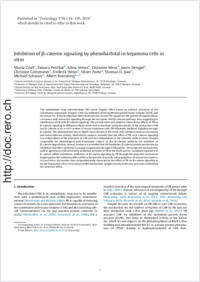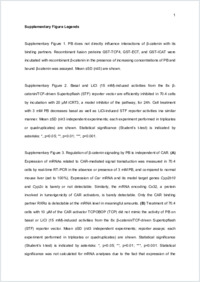Inhibition of β-catenin signaling by phenobarbital in hepatoma cells in vitro
- Groll, Nicola Natural and Medical Sciences Institute at the University of Tübingen, Reutlingen, Germany
- Petrikat, Tamara University of Tübingen, Dept. of Experimental and Clinical Pharmacology and Toxicology, Tübingen, Germany
- Vetter, Silvia University of Tübingen, Dept. of Experimental and Clinical Pharmacology and Toxicology, Tübingen, Germany
- Wenz, Christine University of Tübingen, Dept. of Experimental and Clinical Pharmacology and Toxicology, Tübingen, Germany
- Dengjel, Jörn University of Fribourg, Dept. of Biology, Fribourg, Switzerland
- Gretzmeier, Christine University of Freiburg, Center for Biological Systems Analysis, Freiburg, Germany
- Weiss, Frederik Natural and Medical Sciences Institute at the University of Tübingen, Reutlingen, Germany
- Poetz, Oliver Natural and Medical Sciences Institute at the University of Tübingen, Reutlingen, Germany
- Joos, Thomas O. Natural and Medical Sciences Institute at the University of Tübingen, Reutlingen, Germany
- Schwarz, Michael University of Tübingen, Dept. of Experimental and Clinical Pharmacology and Toxicology, Tübingen, Germany
- Braeuning, Albert University of Tübingen, Dept. of Experimental and Clinical Pharmacology and Toxicology, Tübingen, Germany - Federal Institute for Risk Assessment, Dept. Food Safety, Berlin, Germany
-
31.08.2016
Published in:
- Toxicology. - 2016, vol. 370, p. 94-105
5-ethyl-5-phenylbarbituric acid
Wnt signaling
Liver tumor
Constitutive androstane receptor
Tumor promotion
Hepatocyte
English
The antiepileptic drug phenobarbital (PB) exerts hepatic effect based on indirect activation of the constitutive androstane receptor (CAR) via inhibition of the epidermal growth factor receptor (EGFR) and the kinase Src. It has furthermore been observed that in mice PB suppresses the growth of hepatocellular carcinoma with overactive signaling through the oncogenic Wnt/β-catenin pathway, thus suggesting an interference of PB with β-catenin signaling. The present work was aimed to characterize effects of PB on β-catenin signaling at different cellular levels and to elucidate molecular details of the interaction of PB and β-catenin in an in vitro system of mouse hepatoma cells. PB efficiently inhibited signaling through β-catenin. This phenomenon was in-depth characterized at the levels of β-catenin protein accumulation and transcriptional activity. Mechanistic analyses revealed that the effect of PB on β-catenin signaling was independent of the activation of CAR and also independent of the cytosolic multi-protein complex responsible for physiological post- translation control of the β-catenin pathway via initiation of β-catenin degradation. Instead, evidence is provided that PB diminishes β-catenin protein production by inhibition of protein synthesis via signal transduction through EGFR and Src. The proposed mechanism is well in agreement with previously published activities of PB at the EGFR and Src-mediated regulation of β-catenin mRNA translation. Inhibition of β- catenin signaling by PB through the proposed mechanism might explain the inhibitory effect of PB on the growth of specific sub-populations of mouse liver tumors. In conclusion, the present data comprehensively characterize the effect of PB on β- catenin signaling in mouse hepatoma cells in vitro and provides mechanistic insight into the molecular processes underlying the observed effect.
- Faculty
- Faculté des sciences et de médecine
- Department
- Département de Biologie
- Language
-
- English
- Classification
- Biological sciences
- License
-
License undefined
- Identifiers
-
- RERO DOC 278400
- DOI 10.1016/j.tox.2016.09.018
- Persistent URL
- https://folia.unifr.ch/unifr/documents/305264
Other files
Statistics
Document views: 103
File downloads:
- pdf: 273
- Supplementary material: 157

